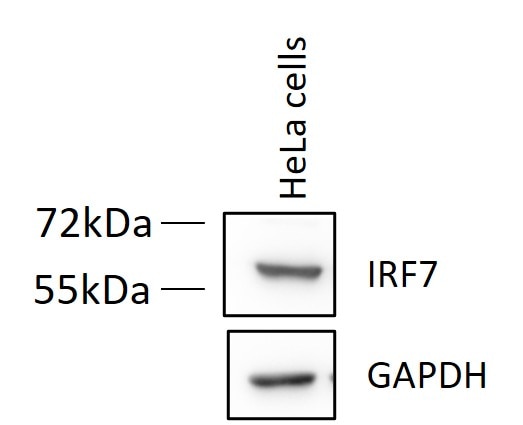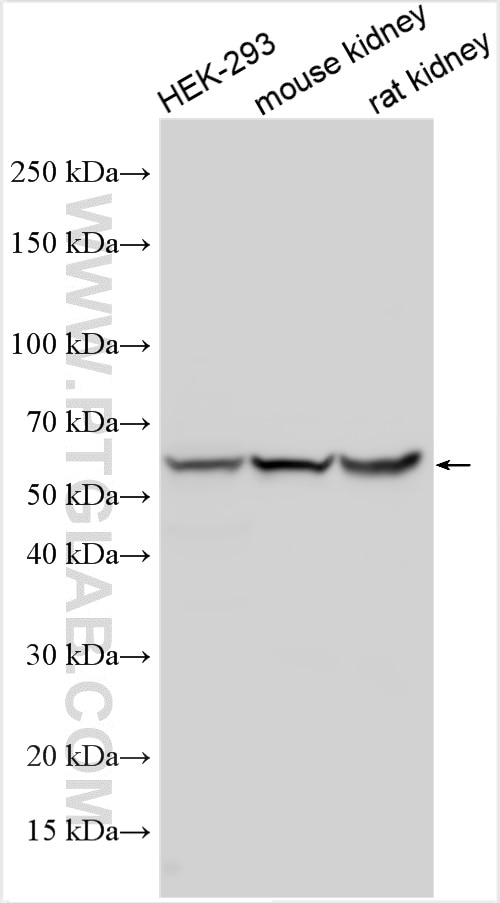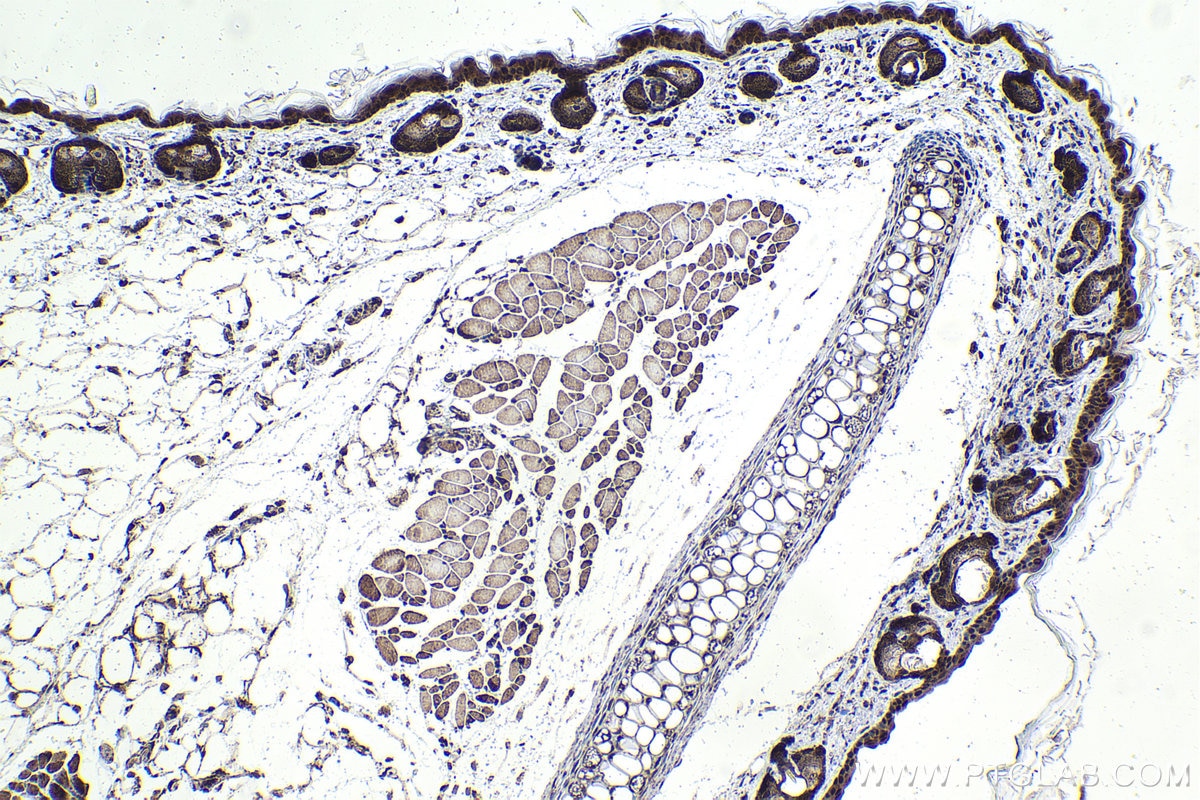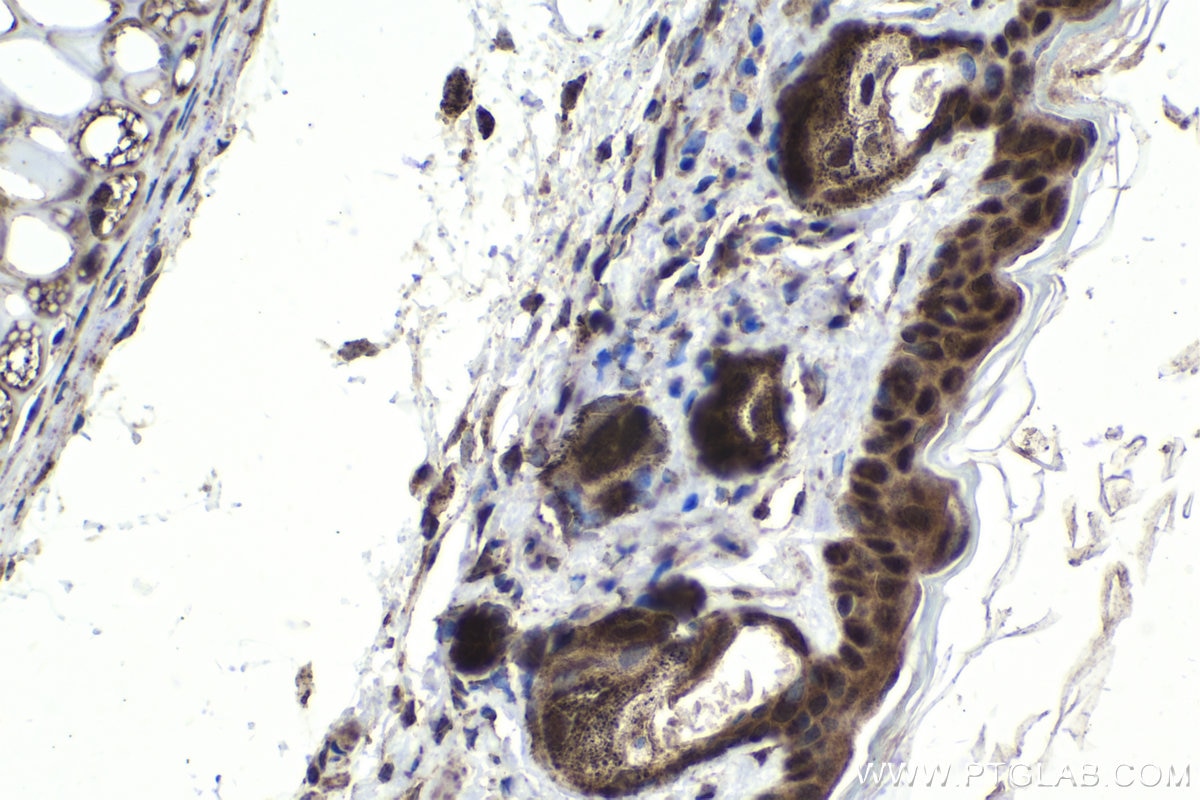Tested Applications
| Positive WB detected in | HEK-293 cells, mouse kidney tissue, rat kidney tissue |
| Positive IHC detected in | mouse skin tissue Note: suggested antigen retrieval with TE buffer pH 9.0; (*) Alternatively, antigen retrieval may be performed with citrate buffer pH 6.0 |
Recommended dilution
| Application | Dilution |
|---|---|
| Western Blot (WB) | WB : 1:2000-1:16000 |
| Immunohistochemistry (IHC) | IHC : 1:250-1:1000 |
| It is recommended that this reagent should be titrated in each testing system to obtain optimal results. | |
| Sample-dependent, Check data in validation data gallery. | |
Published Applications
| KD/KO | See 2 publications below |
| WB | See 24 publications below |
| IHC | See 4 publications below |
| IF | See 4 publications below |
Product Information
22392-1-AP targets IRF7 in WB, IHC, IF, ELISA applications and shows reactivity with human, mouse samples.
| Tested Reactivity | human, mouse |
| Cited Reactivity | human, mouse, pig, duck, paralichthys olivaceus |
| Host / Isotype | Rabbit / IgG |
| Class | Polyclonal |
| Type | Antibody |
| Immunogen |
CatNo: Ag18059 Product name: Recombinant human IRF7 protein Source: e coli.-derived, PGEX-4T Tag: GST Domain: 168-516 aa of BC136555 Sequence: PGPFLAHTHAGLQAPGPLPAPAGDKGDLLLQAVQQSCLADHLLTASWGADPVPTKAPGEGQEGLPLTGACAGGPGLPAGELYGWAVETTPSPGPQPAALTTGEAAAPESPHQAEPYLSPSPSACTAVQEPSPGALDVTIMYKGRTVLQKVVGHPSCTFLYGPPDPAVRATDPQQVAFPSPAELPDQKQLRYTEELLRHVAPGLHLELRGPQLWARRMGKCKVYWEVGGPPGSASPSTPACLLPRNCDTPIFDFRVFFQELVEFRARQRRGSPRYTIYLGFGQDLSAGRPKEKSLVLVKLEPWLCRVHLEGTQREGVSSLDSSSLSLCLSSANSLYDDIECFLMELEQPA Predict reactive species |
| Full Name | IRF 7 |
| Calculated Molecular Weight | 516 aa, 56 kDa |
| Observed Molecular Weight | 55 kDa |
| GenBank Accession Number | BC136555 |
| Gene Symbol | IRF7 |
| Gene ID (NCBI) | 3665 |
| RRID | AB_2879097 |
| Conjugate | Unconjugated |
| Form | Liquid |
| Purification Method | Antigen affinity purification |
| UNIPROT ID | Q92985 |
| Storage Buffer | PBS with 0.02% sodium azide and 50% glycerol, pH 7.3. |
| Storage Conditions | Store at -20°C. Stable for one year after shipment. Aliquoting is unnecessary for -20oC storage. 20ul sizes contain 0.1% BSA. |
Background Information
IRF-7 (IFN regulatory factor 7) is a member of the IFN regulatory transcription factor (IRF) family. IRF-7 has been shown to play a role in the transcriptional activation of virus-inducible cellular proteins, including IFN beta chain proteins. Inducible expression of IRF-7 is largely restricted to lymphoid tissue. Four transcript variants encoding distinct isoforms (A,B,C and D) have been identified for this (PMID:9786932).The active IRF7A exists as a dimer form ~80 kDa(PMID:11073981). The MW 67-70 kDa has been reported in some papers (PMID:9786932; 22951831).Various posttranslational modifications of IRF7 including phosphorylation, ubiquitination, sumoylation and acetylation are identified (PMID:22951831).This antibody is a rabbit polyclonal antibody raised against the C-terminal 349 amino acid residues of human IRF7 D. The molecular weight of Nonphosphorylated IRF7 cofractionated with the 44-kDa marker, approximating its predicted size. In contrast, phosphorylated IRF7, which migrate more slowly on SDS-PAGE. This phosphorylated IRF7 was consistent with a size of 80 to 90 kDa. (PMID: 11073981 )
Protocols
| Product Specific Protocols | |
|---|---|
| IHC protocol for IRF7 antibody 22392-1-AP | Download protocol |
| WB protocol for IRF7 antibody 22392-1-AP | Download protocol |
| Standard Protocols | |
|---|---|
| Click here to view our Standard Protocols |
Publications
| Species | Application | Title |
|---|---|---|
Cancer Lett NR4A1 depletion inhibits colorectal cancer progression by promoting necroptosis via the RIG-I-like receptor pathway | ||
Cell Chem Biol Identifying enhancers of innate immune signaling as broad-spectrum antivirals active against emerging viruses. | ||
J Immunol Inducible TAP1 Negatively Regulates the Antiviral Innate Immune Response by Targeting the TAK1 Complex. | ||
J Immunol Inducible ATP1B1 Upregulates Antiviral Innate Immune Responses by the Ubiquitination of TRAF3 and TRAF6. | ||
Phytomedicine Si-Ni-San ameliorates chronic colitis by modulating type I interferons-mediated inflammation. | ||
Cancer Med A regulatory mutant on TRIM26 conferring the risk of nasopharyngeal carcinoma by inducing low immune response. |
Reviews
The reviews below have been submitted by verified Proteintech customers who received an incentive for providing their feedback.
FH Margaux (Verified Customer) (10-25-2025) | I used this antibody to detect IRF7 in HeLa cells by western-blot. It worked very well at the dilution 1/2000 and it could easily be diluted more.
 |








